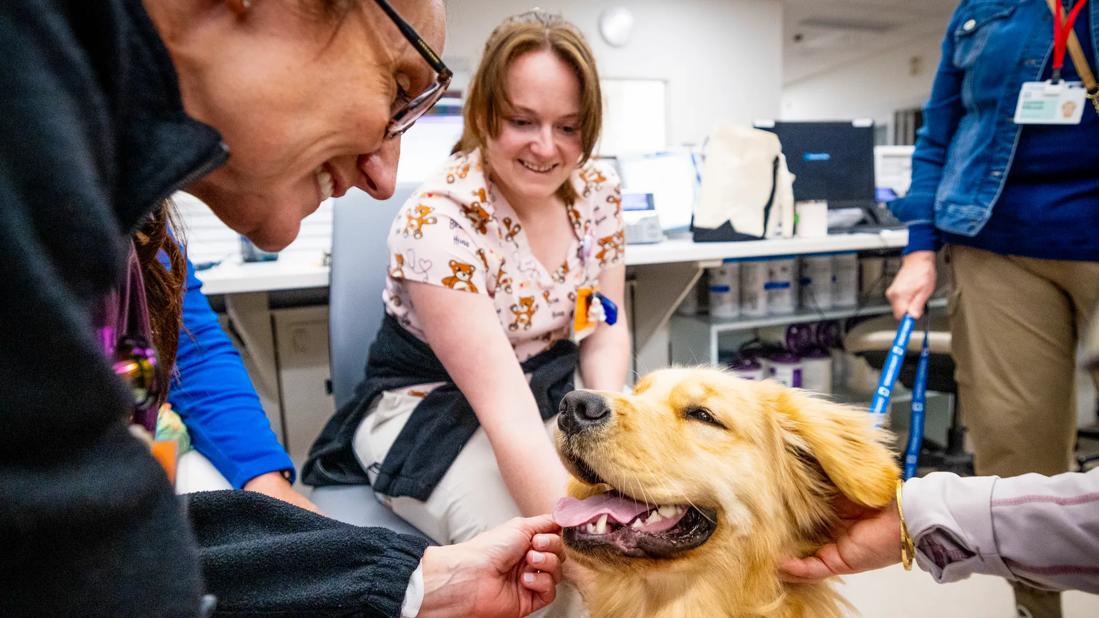Educational tools address caregivers’ unique needs

The World Health Organization defines mental health as a state of well-being in which an individual realizes personal abilities, can work productively, is able to cope with the normal stresses of life, and can contribute to the world around them. With this definition in mind, Cleveland Clinic has developed a new program designed to foster caregiver well-being and help alleviate the unique stressors that can burden healthcare employees.
Advertisement
Cleveland Clinic is a non-profit academic medical center. Advertising on our site helps support our mission. We do not endorse non-Cleveland Clinic products or services. Policy
Launched in 2023, Thrive Where You Are provides a variety of educational experiences designed to address the holistic and well-being needs of the organization’s more than 80,000 employees.
“One of the most meaningful ways we can demonstrate how much we value our caregivers is to voice support for their well-being and back that up with relevant resources,” explains Program Manager Jennifer Sauer, M.Ed. “By investing in our workforce and helping our team members attain the support they need, we can help our entire institution prosper.”
Although the terms “wellness” and “well-being” are often used interchangeably, Sauer reminds her teams that the two are not synonymous. “Wellness is typically used to describe physical health, but that’s only one component of a person’s overall well-being,” she notes. “The goal of our program is to encourage caregivers to broaden their definition of good health by addressing their complex emotional, financial and social lives.”
To reach Cleveland Clinic employees at the individual, team and organizational levels, Sauer’s team established several learning channels from which participants can choose. Designed to address five key dimensions of well-being – physical health, emotional health, financial literacy, social connectedness and professional development – the program, also encourages caregivers to form meaningful peer-to-peer relationships.
Participants are given the opportunity to learn more about a broad range of programs and resources that cover everything from emotional resiliency and sleep hygiene to preparing for retirement and workplace advancement. In addition to a comprehensive 60-minute virtual course, the program provides a self-directed, 10-minute eLearning module and in-person roundtable discussions that focus on various aspects of health and wellness.
Advertisement
“Because we have such a large audience, we wanted to create a flexible well-being experience that gives our caregivers the time and space they need to connect directly with the support services our organization provides,” she says. “In order to make the program accessible to our employees, we knew we’d have to offer a variety of time-sensitive learning options.”
Since its inception, Thrive has reached more than 5,000 caregivers through its on-site and virtual courses. Sauer notes that the program has resulted in “real ‘a-ha’ moments” for a number of learners. Participant feedback indicates that nearly 80% of those who complete the program say they would recommend the experience to a colleague.
“We’re thrilled that the program has been so well-received,” Sauer says. “If it seems hard to focus on your own health and well-being, that’s because it is hard – but Thrive reassures caregivers that it’s worth the effort. We want to help participants examine their own feelings and beliefs and the crucial role they play in guiding their professional lives.”
Expanding on their success, Cleveland Clinic’s Caregiver Office is developing a series of one-page “boosters” – micro-learning tools designed for individuals and healthcare teams that have already completed the Thrive curriculum. Designed to supplement regular caregiver meetings, the boosters are intended to keep the well-being conversation going, says Sauer.
“It’s no secret that healthcare jobs are difficult,” she says. “Caregivers may be great at looking after others, but they’re not always good at addressing their own needs. Our goal is to make well-being as accessible as possible to our employees so they can nurture themselves – and, in turn, create a safe, compassionate space for our patients.”
Advertisement
Advertisement
Advertisement

Interdisciplinary program fosters high-performance teams

1:1 guidance benefits individuals and organization

Strategies for building connections, staying present

Development leader harnesses shared purpose to fuel meaningful giving

Expert tips from Cleveland Clinic’s Chief Legal Officer

Dedicated leader shares her passion for quality, education and professional development

Groups move the metrics in environmental services and sterile processing

Certified coaches help hospital teams build trust, improve communication